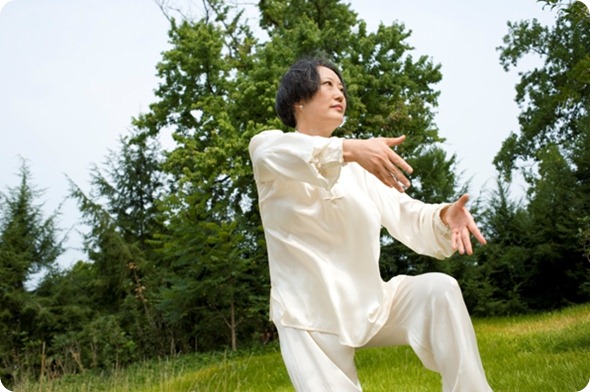A latest study from Harvard Medical School has found that Tai chi, often called “meditation in motion,” appears to improve the quality of life in people with heart failure. The ancient Chinese exercise of tai chi features physical movements that are slow and gentle and require concentration. The study is published in the April 25, 2011 issues of the Archives of Internal Medicine.
“Historically, patients with chronic systolic heart failure were considered too frail to exercise and, through the late 1980s, avoidance of physical activity was a standard recommendation,” the researchers write. And, until now, the effects of meditative exercise have not been rigorously studied in a large group of heart failure patients.
The researchers at Harvard and Beth Israel Deaconess Medical Center followed 100 outpatients who had reduced heart-pumping function and put them into two random groups of 50. One group took part in a 12-week tai chi-based exercise program, and the other group received time-matched education sessions. Both groups attended their sessions twice per week and were similar in terms of baseline demographics, severity of heart disease, and rates of other medical conditions.
Results at the end of the study showed that people practicing tai chi had greater improvements in quality of life, including increased confidence to perform various forms of exercise, increased daily activity levels, and greater feelings of well-being, as compared to people in the education-only cohort.
According to researchers the exercise encourages gentle, flowing circular movements, balance and weight shifting, and practicing of breathing techniques. They call it “safe and has good rates of adherence." This form of exercise may also be beneficial for people with hypertension, balance problems, impaired exercise capacity, musculoskeletal diseases, and fibromyalgia the researchers write. The exercise appears to decrease anxiety, enhance vigour, and improve mood and is a safe alternative to moderate-intensity conventional exercise training.
“Tai chi training improved important parameters of quality of life, mood and confidence to perform exercise in patients with heart failure,” said lead researcher Dr. Gloria Yeh, from the division of general medicine and primary care at Beth Israel Deaconess Medical Center and an assistant professor of medicine at Harvard Medical School. “Maintaining an exercise regimen is important in heart failure, and Tai chi may be a suitable alternative or adjunct exercise for these patients,” she said. Tai chi incorporates low/moderate intensity aerobics with strength training, breathing techniques, relaxation and stress management, Yeh explained.
Dr. Gregg Fonarow, associate chief of cardiology at David Geffen School of Medicine at University of California Los Angeles, noted that “heart failure results in substantial impairment in functional capacity, quality of life and mood.” “While traditional aerobic exercise may provide some benefits to patients with heart failure, many heart failure patients have difficulty in engaging and sustaining regular aerobic exercise,” he added. There has been increasing interest in using mind-body exercises such as Tai chi for patients with heart failure, Fonarow said. “It may be more easily implemented, pleasant and have the additional benefit of meditation,” he added.
“As a complement to standard medical care, this study has demonstrated that Tai chi enhanced quality of life, mood and exercise self-efficacy,” Fonarow said. “Tai chi appears to be a safe alternative to low- to moderate-intensity conventional exercise training in patients with heart failure. Further studies are needed to compare Tai chi to aerobic exercise training, and to determine if participation in Tai chi will have a favourable impact on risk of hospitalization or survival in patients with heart failure.”